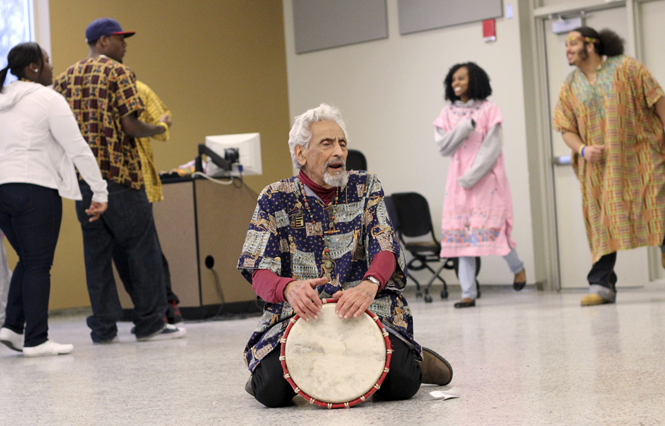Egyptian professor inspires students with African dancing
Halim El-Dabh, Pan-African Studies professor, performs with his Cultural Expressions class Wednesday night at Oscar Ritchie Hall. Photo by Anthony Vence
April 21, 2011
Sporting a mix of modern clothing and what looked like traditional African garb, students’ bodies moved in lively, haphazard dances from different African cultures in Oscar Ritchie Hall on Wednesday evening.
Halim El-Dabh, Pan-African studies emeritus professor, led the students as they performed their project put together in El-Dabh’s Cultural Expressions classes.
Before each dance began, he gave an explanation of the dance’s significance.
“The activity itself is really not a show, but it’s a way of life to do it,” El-Dabh said.
El-Dabh has produced 13 albums and composed the music for a show performed at the Great Pyramids in Giza, Egypt.
Wendy Wilson-Fall, chair of Pan-African studies, compared the dancing modern Americans do today and these African dances. She said the context is different, and the African dances are not necessarily sexual.
“In many cultures, it has nothing to do with sex, but it has to do with your body,” she said.
Wilson-Fall elaborated on the meaning of different forms of dance.
“People shake their butts in all African dance, but it’s not really sexual.”
El-Dabh did not use music in Wednesday’s performance aside from occasionally beating a drum. He said music comes from within.
“I don’t use exterior music to dance to because that would be contrary to the nature of the experience,” he said. “We generate sound that we dance to. I don’t put a recording (on) and dance to it. The group generates its own music.”
Alexis and Joe Kline, both members of the Stow community, said they came for personal enjoyment after hearing about the show on Facebook.
“We’re interested very much in the West African rhythms and always have been, so we wanted to come out and see what Halim was conducting here with his students,” Joe Kline said.
El-Dabh emphasized the link between African cultures and their music and dances.
“The real history of Africa comes from its songs and dances,” El-Dabh said.
Contact Ryan Collins at [email protected].

























